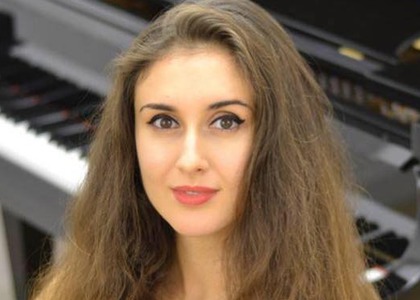> [Archived] Interviews

An interview with pianist Sînziana Mircea (I)
An outstanding ambassador of the new generation pianists, Sînziana Mircea enjoys her extraordinary interpreter career on international scale. Tokyo Metropolitan Theatre, St. Martin-in-the-Fields in London, or Carnegie Hall in New York are among the most important stages where Sînziana Mircea enchanted the audience. Also, the young pianist returns, with great pleasure, to the Romanian stages, the next event where we'll be able to re-listen to her, being the recital on the 14th of November, 2019, at Sala Radio. About this recital, as well as about other major moments of her career, we will be told by Sînziana Mircea herself, who you'll be listening to in the first of the three parts of the interview.
The dream of any young pianists if that of having a brilliant career, full of events, at the end of which the audience would burst into wild applause. Even though you left the school benches a short while ago, you already have an impressive career path, crowned with important prizes and performances on the world's grand stages. But we all want to know, what have determined you to follow the music's path?
My parents are the ones who have always supported me, and they still do it. They encouraged any passion of mine. When I was young, I also did ballet and music classes ... and they told me: "let's see whether you'll like to play the piano or not." So, being maybe too young, I went to the concerts, where I made a little noise. I had my debut in the concert halls, firstly, by talking loud, which wasn't necessarily a good thing, but I started going to concerts with my parents as a child, to the opera, then, to the musical kindergarten, and such like, until I got here, today. From a day to another, I've always kept choosing music over anything else, today and ever...
After graduating "George Enescu" Music Lyceum you continued your piano training at foreign faculties. What is the difference between their and our environment in the music institutions?
Firstly, I owe my development as a musician mostly to the Romanian school. I finished the lyceum in the class of Madame Professor Olga Szel, who is like a grandmother to me and always coming to my concerts in Bucharest, and I'm very thankful to her. After the years of lyceum, in which I'd also studied with Madame Professor Stela Drăgulin from Brașov, I really chose to go abroad. It was also a big curiosity, especially because I knew that the level of teaching in Europe is very high. I knew that everyone wanted to go to Germany, and I wanted to give it a try myself, to see what happens. It was a very, very tough admission, more than 200 candidates for only 7 places, but I got in in the Cologne University of Music, the biggest in Europe, by the way. There, I met everyone brusquely: Chinese, Koreans, Russians, Americans, everybody who wanted to study music in Germany, the motherland of Beethoven and Bach - and it was a step that really changed my life.
How would you describe the life of an interpret, considering the fact that you took the numerous prestigious stages of Europe, North America, or Asia.
It's a very diverse life, because you often travel to new places, see astonishing places, which you want to see at least as a tourist, and, besides this, indeed, it's all about strict discipline, because you're in a new country, in a hotel room where you must make the program all by yourself, you organize yourself in such a way, that the following day, at the concert, you will give the best of you. So, there is the glamorous part, in which you're always on the road, but also a quite detached part - you and your music, you and your instrument - in which you prepare for the concert.
Translated by Cotar Alexandr, Universitatea București,
Facultatea de Limbi și Literaturi Străine, MTTLC, anul I














